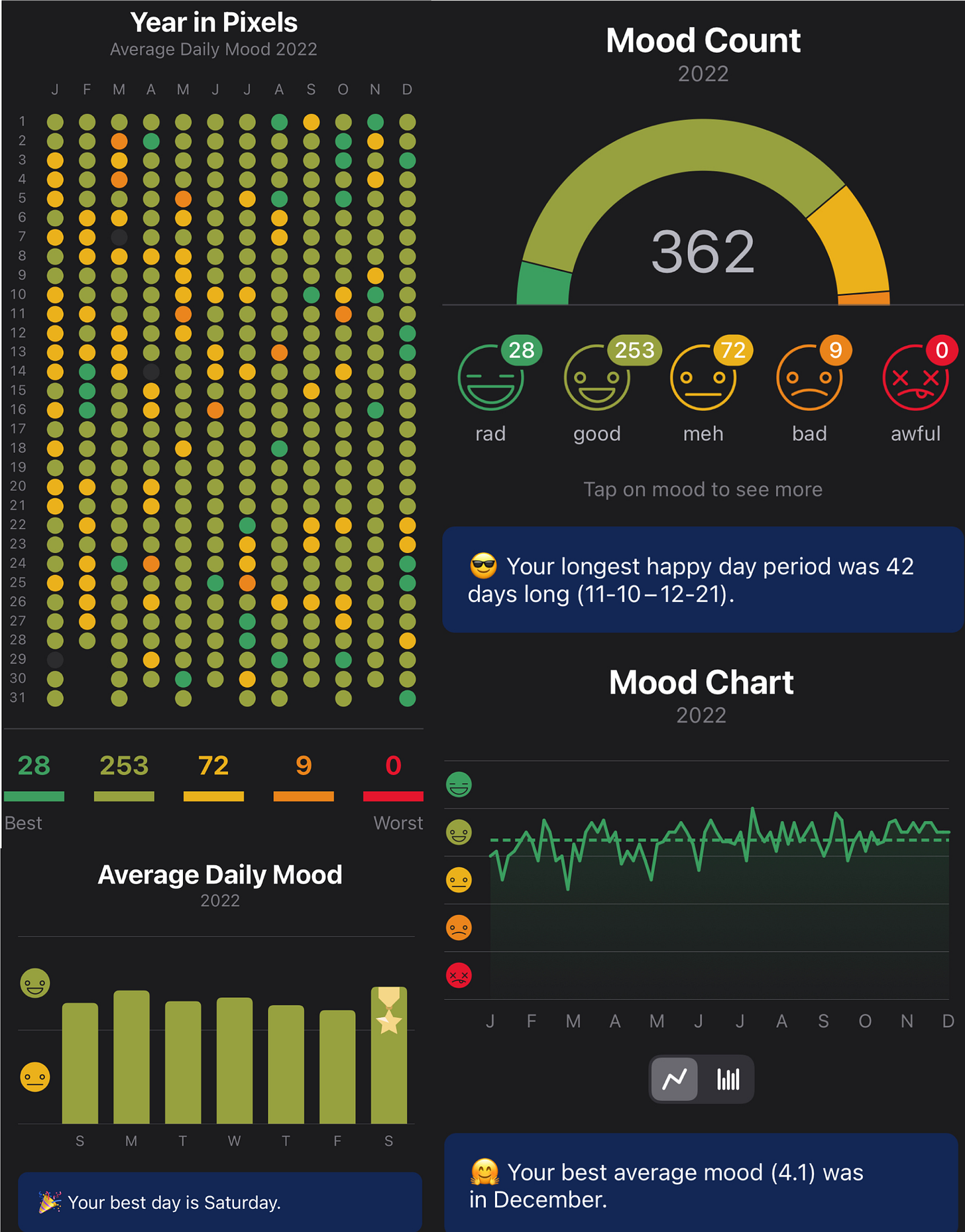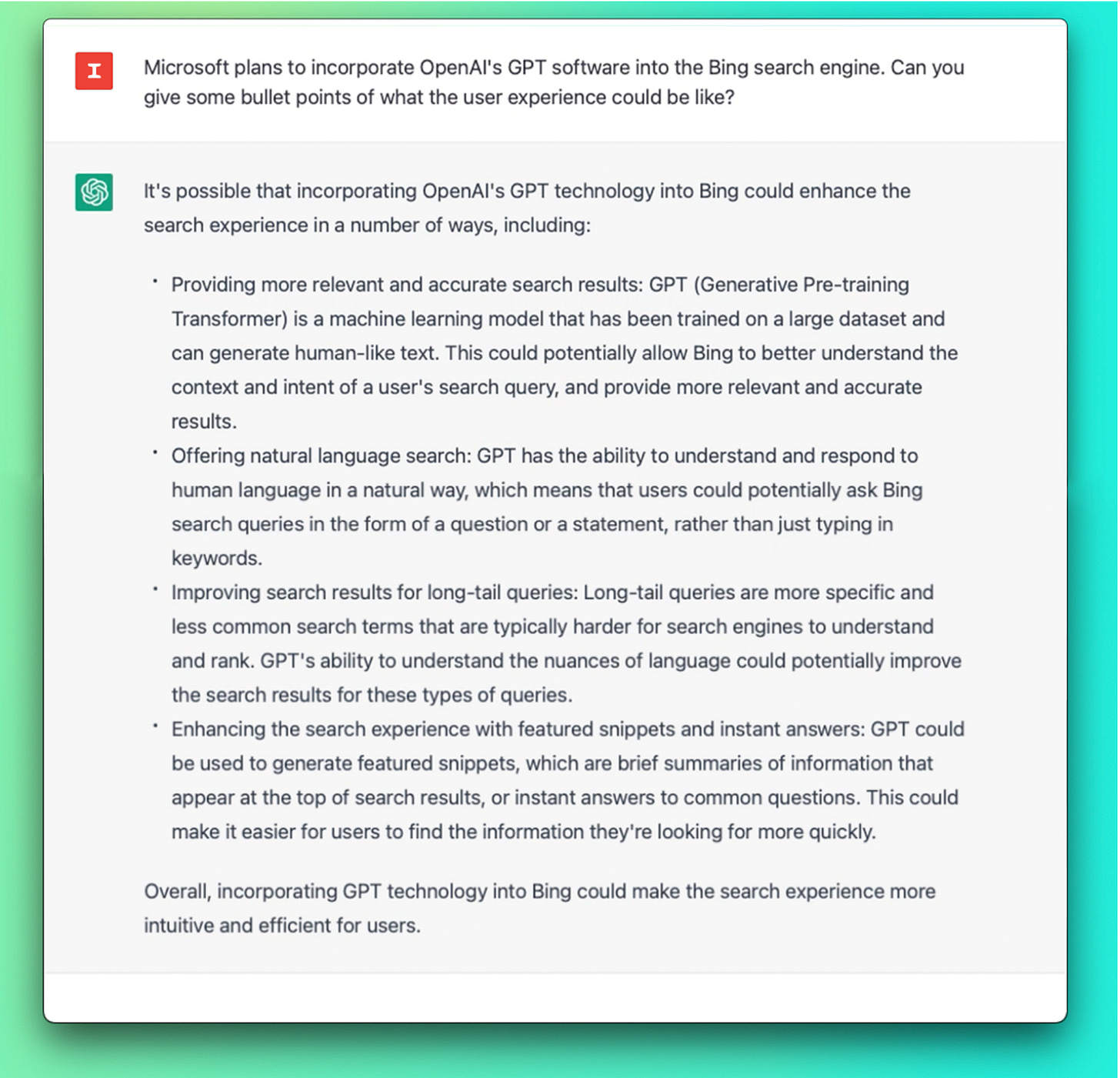371: Bing + ChatGPT vs Google, Shopify Ads vs Apple ATT, Podcast Market Correction, Amazon, Buffett, SpaceX, AI Sparsity, and The Bear
"Anything interesting is polarizing in some way."
Double down on your best relationship. It's the investment with the highest return. —James Clear
🗓️😁😐😔📲 I have been using a mood-tracking app for a few years. The one I use is called Daylio, but I’m sure there are many others.
At the end of each day, it prompts me to rate how I feel from 1 to 5, with 3 being neutral. I also tag activities I did that day (ie. exercise, time with family, working, fasting, alcohol, being sick, walk in nature, etc).
Two years ago in edition #81, I wrote about that year’s overview.
This year doesn’t have too many surprises. My set point mood seems to be “good”, with my best days being Saturday and Monday. I didn’t have a single day that I would rate a “1” (worst), and only 9 that I ranked “2” (bad), but I had two whole months of “meh” scattered through the year. This was 16 more “meh” days than in 2021, when I had 56.
My longest unbroken streak of happy days this year was 42 in a row (rated 4 or 5).
Why do this?
There’s no huge revelation, but my memory’s very bad at giving an accurate picture for a whole year — it can seem better or worse than it actually was based on whatever is currently coloring my perception — so I’m glad to have more reliable data on how I actually felt at the time. You can sometimes find interesting correlations with activities/tags over time (try to do more of the positive stuff!).
I feel lucky because I know that some people have a calendar with a lot more orange and red days.
If you’re not doing mood-tracking, I encourage you to give it a try.
Know thyself is a very important Life Unlock™️, and this may help nudge you a bit.
🇪🇺💶 🤔 I wonder how much of the EU's budget is financed by fines on US Big Tech…?
💪 The highest return on investment (ROI) is on foundational skills like: "learning", “communication”, "giving a damn" and "not giving up when you shouldn’t and giving up when you should" (in other words, focus and working on the right things).
Anything that gives you reps and improves these skills will pay huge dividends over your whole life for as long as ye shall live. Everything else is downstream.
🧲 🧭 Anything interesting is polarizing in some way.
(I don’t mean controversial. Polarizing isn’t quite the same — I mean it doesn’t leave you indifferent, without an opinion)
If something is for “everyone”, it’s for no one specifically. If nobody reacts negatively, it’s probable that no one is reacting much at all.
Whatever you’re building, as long as you keep making it better *for those who love it*, you can safely ignore the haters.
👩🏻🍳🤔 I have long wondered if it was worth paying way more for real vanilla compared to artificial vanilla extract. How much of a difference does it really make?
Ethan explains the science behind vanilla and conducts a series of blind tests:
🏦 💰 Liberty Capital 💳 💴
👩🔬🧬👩💻 Microsoft to Inject some ChatGPT DNA into Bing Search
In edition #363, I wrote about the impact of LLMs like ChatGPT on Google’s Search business. For my full views, it’s best to start there.
Things appear to be playing out rather quickly, as The Information reports that Microsoft is working to incorporate some of OpenAI’s tech into its Bing search engine:
Microsoft is preparing to launch a version of its Bing search engine that uses the artificial intelligence behind ChatGPT to answer some search queries rather than just showing a list of links, according to two people with direct knowledge of the plans. Microsoft hopes the new feature, which could launch before the end of March [...]
Details of Bing’s integration of OpenAI software couldn’t be learned, but the technology could power more full-sentence answers to questions from Bing users.
Part of the value must lie in Bing’s user base.
By obtaining more feedback on the quality of answers, OpenAI can tighten its reinforcement learning from human feedback (RLHF) loop and potentially improve the model more quickly.
As The Information also reported, Microsoft has essentially been footing the startup’s cloud bill as it trains machine-learning models on data across the internet to develop tools that help people generate text, computer code and imagery in response to a few simple text prompts. [...]
what OpenAI didn’t say was that the 2019 Microsoft investment included an agreement to incorporate some aspects of GPT into Bing. Microsoft said in October that it was integrating a different OpenAI model—an image-generation tool, Dall-E 2—with Bing’s Image Creator tool. And Bing teams have previously incorporated an older version of GPT into Bing in minor ways, including to power its automatic search suggestions that appear as people type. The forthcoming announcements will reveal more meaningful features, according to someone with direct knowledge of the situation
We know that OpenAI is working on WebGPT, a version of their LLM that has internet access, but it may not be ready for prime time yet. It’ll be interesting to see how deeply Bing’s integration with a LLM goes.
Another big challenge is to reduce ‘hallucinations’ — the model just making stuff up — but I suspect that they’ve made progress on this or they wouldn’t be thinking of including it into a search engine.
But even if the model is just used to produce better summaries of content, it could be quite useful in improving the quality of zero-click answers.
What about the impact on Google?
There may be an interesting dynamic at play here, where because Bing is much smaller than Google, it would be less expensive for it to integrate more LLM tech into its search engine while gaining more relative upside from it.
Here’s the summary version of my thoughts:





